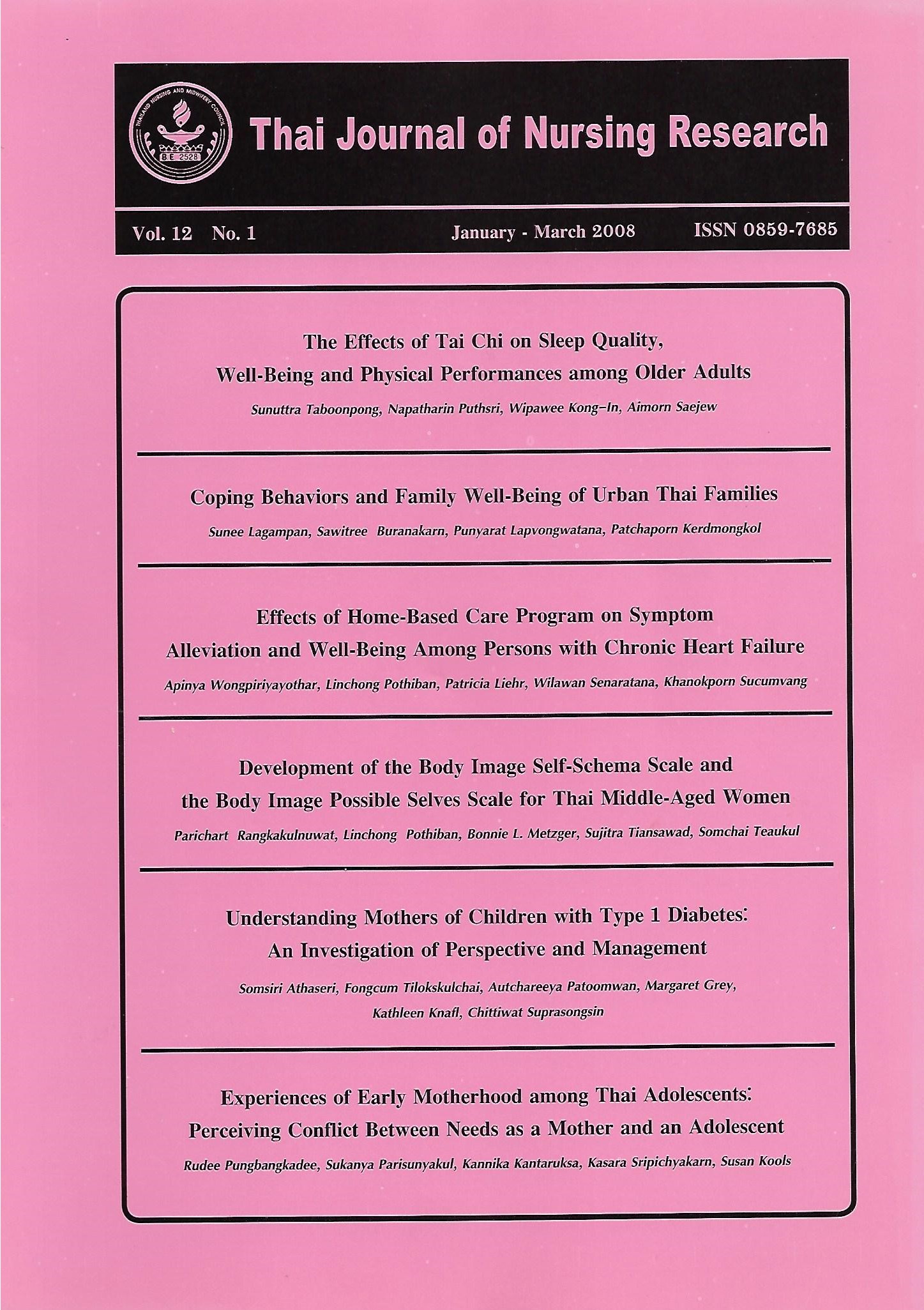Understanding Mothers of Children with Type 1 Diabetes: An Investigation of Perspective and Management
Keywords:
มารดา, เด็กวัยเรียน, โรคเบาหวานชนิดที่ 1, การรับรู้, การจัดการ, mothers, school-age children, type 1 diabetes, perspective, managementAbstract
การวิจัยเชิงคุณภาพนี้มีวัตถุประสงค์เพื่อศึกษาการรับรู้และการจัดการของมารดาที่มีป่วยด้วยโรคเบาหวานชนิดที่ 1 โดยสัมภาษณ์มารดาจำนวน 22 คนที่มีบุตรอายุ 6-12 ปีและเป็น โรคเบาหวานชนิดที่ 1 ผลการศึกษาพบว่า มารดาบางคนให้ความหมายของการที่มีบุตรป่วยใน ครอบครัวเป็นเรื่องปกติ ส่วนบางคนมองว่าเป็นเรื่องที่ทำให้เกิดทุกข์ และมารดาเหล่านี้มีทั้งรับรู้ว่าตนเองสามารถจัดการกับโรคนี้ได้และไม่ได้ รวมทั้งบางคนมองว่าการจัดการนี้เป็นภาระ ส่วน กิจกรรมที่มารดาต้องจัดการในแต่ละวันคือ การจัดการกับโรคตามแผนการรักษาของแพทย์และ การดูแลในเรื่องทั่วๆ ไป นอกจากนี้มารดายังรับรู้ว่าตนเองและสมาชิกครอบครัวได้รับผลกระทบในทางที่ไม่ดีจากการที่มีบุตรป่วยเป็นโรคเบาหวานชนิดที่ 1 ในครอบครัว
การเข้าใจความหมายและการจัดการของครอบครัวที่มีบุตรป่วยผ่านทางมารดาทำให้ทีมสุขภาพเข้าใจถึงความยากลำบากในการจัดการของแต่ละครอบครัวและนอกจากนี้ยังช่วยขยายความรู้เกี่ยวกับครอบครัวที่มีบุตรป่วยเป็นเบาหวานชนิดที่ 1 ให้สามารถพัฒนาให้เห็นถึงความสัมพันธ์ของปัจจัยที่มีผลต่อการจัดการรูปแบบต่างๆ ต่อไป
Families with children with type 1 diabetes (T1D) encounter many stressful experiences. The mother is a significant person in taking care of a child’s diabetes. However, little is known about the experiences of mothers living with a child with T1D in Thailand. This study aimed to describe mothers’ definition of their predicament, management behaviors and consequences of having a child with T1D. A descriptive qualitative approach was used, and data were elicited from interviewing 22 mothers living with a child aged 6-12 with T1D. Content analysis was used for data analysis.
It is found that both mothers who perceived T1D was a non-life threatening and serious disease could manage their disease. The meaning of having a child with T1D was either part of life or as a situation beset with dukkha (the Buddhist concept of suffering). Most mothers could manage the disease even though some perceived that they were burdened by it. Major activities included diabetes management activities and day to day management activities. The difficulty of balance family relationships, social life, lifestyle and finances was found in some families.
The findings indicated that understanding of mothers’ response to the illness situation was a crucial guideline for supporting the family and lead to further clinical exploration and research.
References
2. Likitmasakul S, Morris S, Chaicharnwattanakul K, Angsusingha K, Kiattisakthavee P, Tuchinda C. Type 1 diabetes in Thai children Aged 0-14 years. J Med Assoc Thai. 1999; 82: 826.
3. Hatton DL, Canam C, Thorne S, Hughes AM. Parentsû perceptions of caring for an infant or toddler with diabetes. Journal of Advanced Nursing. 1995; 22: 569-577.
4. Koizumi S. Japanese mothersû responses to the diagnosis of childhood diabetes. Journal of Pediatric Nursing. 1992; 7: 154-160.
5. Athaseri S, Patoomwan A, Arpanantikul M. Experiences of mothers living with children with diabetes. Unpublished manuscript, Mahidol University, 2003.
6. Knafl KA, Deatrick JA. Further refinement of the family management style framework. Journal of Family Nursing. 2003; 9: 232-256.
7. Sandelowski M. Whatever happened to qualitative description? Research in Nursing & Health. 2000; 23: 334-340.
8. Polit DF, Beck CT. Nursing research: Principles and methods 7th ed. Philadelphia: Lippincott Williams & Wilkins, 2004.
9. Dhammasami V. Concept of Dukkha. 2007 [cited 2007 March 19]; Available from: URL: https:// www.web.ukonline.co.uk/buddhism/page4.html
10. Po J. Critical Examination of the Concept of Dukkha in Buddhism. 2007 [cited 2007 March 19]; Available from: URL: https://www.4ui.com/eart/197east1html
11. Gallo AM, Knafl KA. Parentsû reports of çtricks of the tradeé for managing childhood chronic illness. Journal of the Society of Pediatric Nurses. 1998; 3: 93-101.
12. Patoomwan A. Living with childhood cancer in Thai families: Stories of struggling with uncertainty Doctoral Dissertation. University of California San Francisco, San Francisco, California, 2001.
13. Hauenstein EJ, Marvin RS, Snyder AL, Clarke WL. Stress in parents of children with diabetes mellitus. Diabetes Care. 1989; 12: 18-23.
14. Dashiff CJ. Parentûs perceptions of diabetes in adolescent daughters and its impact on the family. Journal of Pediatric Nursing. 1993; 8: 361-369.
15. Azar R, Solomon CM. Coping strategies of parents facing child diabetes mellitus. Journal of Pediatric Nursing.
2001; 16: 418-428.
16. Sethabouppha HP. Buddhist family caregiving: A phenomenological of family caregiving to the seriously mentally ill in Thailand. Doctoral Dissertation. University of Virginia, Virginia, 2002.
17. Sullivan-Bolyai S, Deatrick J, Gruppuso P, Tamborlane WV, Grey M. Constant vigilance: Mothersû work parenting young children with type 1 diabetes. Journal of Pediatric Nursing. 2003; 18: 21-29.
18. Urban AD, Grey M. Type 1 diabetes. Nursing Clinics of North America. 2006; 41: 513-530.
19. Follansbee DS. Assuming responsibility for diabetes management: what age? what price? Diabetes Educator. 1989; 15: 347-353.
20. Natamonkonchai S, Prateepchaikul L, Chaumpluk R, Isaranurug S, Nieamsup T, Mo-Suwan L. Child Rearing Practice of Thai Families: A Quantitative and Qualitative Study. The Thailand Research Fund, 2005.
21. Koizumi, S. Japanese mothersû responses to the diagnosis of childhood diabetes. Journal of Pediatric Nursing.
1992; 7: 154-160
22. Intaravichai B. The relationship between demographic and childûs illness factors, social support and mental
health of mothers of chronically ill children. Unpublished thesis of master degree of nursing science,
Mahidol University, 1996.
23. Mellin AE, Neumark-Sztainer D, Patterson JM. Parenting adolescent girls with type 1 diabetes: Parentsû perspectives.Journal of Pediatric Psychology. 2004; 29: 221-230.
24. Gallo AM, Breitmayer BJ, Knafl KA, Zoeller LH. Mothersû perceptions of sibling adjustment and family life in childhood chronic illness. Journal of Pediatric Nursing. 1993; 8: 318-324.
Downloads
How to Cite
Issue
Section
License
Copyright: The Pacific Rim International Journal of Nursing Research, Thailand Nursing & Midwifery Council has exclusive rights to publish, reproduce and distribute the manuscript and all contents therein.








.png)



